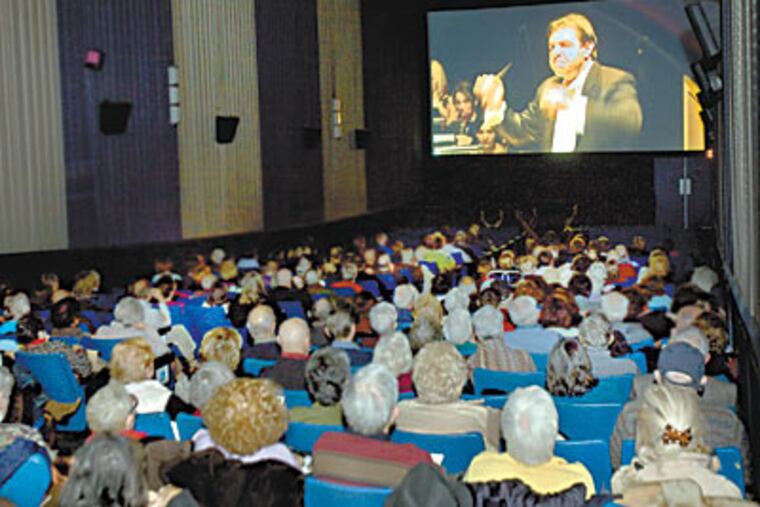Live, via satellite, Bryn Mawr audience sees La Scala
Drama, passion at the opera, intrigue, betrayal, a star-crossed moment, a king topples, a star rises - a chorus swells.

Drama, passion at the opera, intrigue, betrayal, a star-crossed moment, a king topples, a star rises - a chorus swells.
And that was before the curtain went up yesterday at the storied annual opening of the La Scala opera house in Milan.
Because when the curtain rose, the lead tenor in Guiseppe Verdi's masterpiece, Don Carlo, was not the famous Guiseppe Filianoti, the singer listed in the program. No!
It was Stuart Neill, who, until his marriage ended a few years ago, lived in Haddonfield, a graduate of the Academy of the Vocal Arts, and a regular performer in concerts around the world and the region.
So many legends, so many traditions - and now, because of simulcasting, opera fans - such as the 275 at the Bryn Mawr Film Institute - could enjoy opening night at La Scala.
"It's my religion," said Mary Ann Kusner of West Chester, who attended yesterday's event. "It lifts me into the stratosphere."
In the world of opera, there is nothing that compares to the opening night of La Scala. Dignitaries from around the world in tuxedos and evening gowns attend the event, held yearly on Dec. 7, to honor St. Ambrose, the patron saint of Milan.
Nearly as storied as the event is the teatro's reputation for intrigue and drama, with a backdrop of strikes, personality disputes, and artistic differences nearly eclipsing the opera itself.
This year, the intrigue seemed to be ended just last week when the Fials theater union, which represents half of the orchestra and half of the chorus singers, settled a strike that began in July.
But that was just the first act.
Yesterday, unexpectedly, La Scala removed Filianoti from his role, saying that Neill was in better shape.
Filianoti told Milan's Corriere della Sera newspaper that he felt "betrayed" by the house, "stabbed in the back at the last minute.
"La Scala wanted me to say I was sick," he said. "But I, Giuseppe Filianoti, am in perfect condition, ready to engage myself in a role in which I feel secure."
Meanwhile, Neill sent an e-mail yesterday to his coach, accompanist and longtime friend Richard Raub, master vocal coach at the Academy of Vocal Arts in Center City.
Neill graduated from the AVA in 1995, having moved to Philadelphia from his home outside Atlanta, where he had worked in a hardware store mixing paints, Raub said.
"Just a note to share with you my excitement but is reflective of you and all of your work with me," Neill said in the 6:04 a.m. e-mail.
"I'm at La Scala . . . as of yesterday, Mr. Filianoti was released of contract and I have now been given all the performances . . . All my best, Stuart."
It looked almost as though Neill would escape another La Scala tradition: the boos and jeers from the loggionisti, the La Scala equivalent of opinionated loudmouths in the 700-level at the Vet.
"These are the guys who will boo you if you miss the slightest thing," said Giovanni Cozzi, president of Emerging Pictures, the New York company that makes the broadcasts possible.
The Metropolitan Opera began the format several years ago, but Bryn Mawr and other movie theaters couldn't afford to tap in.
Through Emerging Pictures, opera fans at movie theaters can see Mozart's Don Giovanni at the Salzburg Festival in Austria and Rigoletto, another Verdi opera, at the Teatro Regio in Parma, Italy.
Mostly, the fans see carefully filmed re-broadcasts of live opera. But, yesterday's event was unique, because it was simulcast, shown in theaters and concert halls around the world.
The popularity of these series has had an impact on opera as it draws a younger, more movie-oriented audience, Cozzi said. The performers' "acting ability has become more important, as well as the costumes and the staging."
Yesterday, the cameras showed the elegant audience mingling in the theater, kissing one another on both cheeks in the Italian way. The cameras paused lovingly on the theater's architectural details - resting on a curve in a balustrade, or on a glimmering facet in a chandelier.
When the music began, the audience in Bryn Mawr was as quiet as the crowd in Milan, applauding with their counterparts in Italy at the end of the magnificent duet between Neill, as Don Carlo, and his best friend, Rodrigo, performed by baritone Dalibor Jenis.
And they could see Neill, standing beaming and proud as the Milan crowd mostly cheered - just a few jeers - during the curtain call.
No one jeered in Bryn Mawr - but then again, no one would.
Esther Wills, 27, of Ardmore, was among the youngest at yesterday's event. Wills, a graduate student at Bryn Mawr College, said many of her friends love opera and they love seeing it at a movie theater for $25. "I like not having to dress up," she said. "It's almost like watching opera in your living room."
When the performance ended, Bryn Mawr Film Institute director Juliet Goodfriend heaved a sigh of relief. She had worried all week about problems with the satellite dish, being used for the first time yesterday. "I thought it was a tremendous success," she said. "People were thrilled."